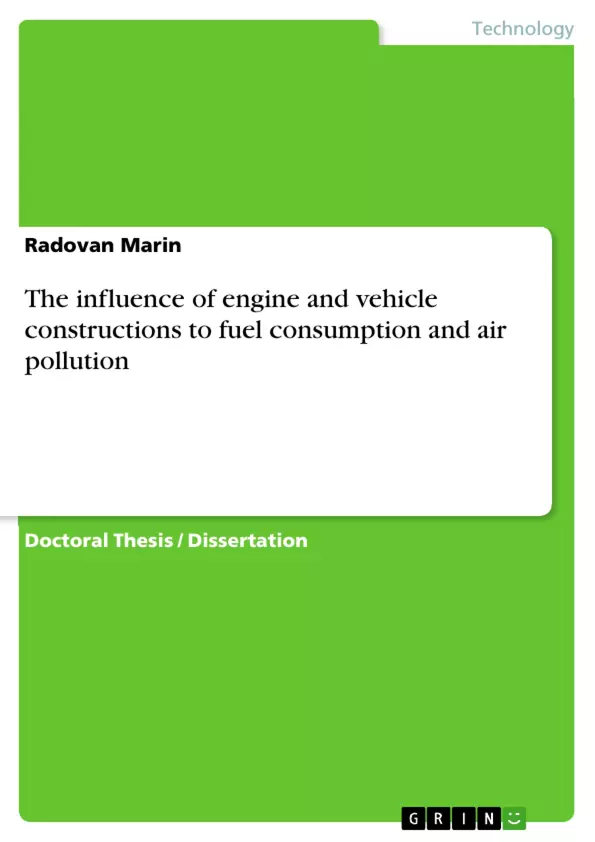This work analyses and explains the influence of engine and vehicles constructions to fuel the consumption and emission of harmful gases.
The work states how new innovations, mostly personal vehicles, contribute to increased air pollution and some innovations which contribute to the reduction of air pollutions, which are ignored in the interest of car manufacturers and their profit they make keeping technology as it is.
It is quite explicit, that most of the innovations made on recent manufactured cars are simply done to attract buyers as such modifications improve the vehicle’s performances but do not contribute to green environment. Several examples are stated where it is clearly explained how some existing technologies can be used to reduce the emission of harmful gases as well as some suggestions of modified technologies which would also contribute to the reduction of air pollution.
Inhaltsverzeichnis (Table of Contents)
- Abstract
- Introduction
- 1. Historical context of motor vehicle technology and development of Innovations
- 1.1 Engines
- 1.1.1 Otto engines
- 1.1.2 Transmissions
- 1.1.3 Vehicles drag koeficient
- 1.1.4 Tires
- 1.1 Engines
- Literature
Zielsetzung und Themenschwerpunkte (Objectives and Key Themes)
This dissertation investigates the impact of engine and vehicle construction on fuel consumption and emissions. It explores how modern innovations, particularly in personal vehicles, contribute to increased air pollution and examines why certain innovations that could reduce pollution are overlooked due to manufacturer profits. The work analyzes the influence of various technological advancements, including improvements in engine efficiency, transmission design, and vehicle aerodynamics, on environmental impact.
- Influence of engine and vehicle design on fuel consumption
- Impact of modern vehicle innovations on air pollution
- Analysis of existing technologies that can reduce emissions
- Discussion of potential technological advancements to mitigate pollution
- Evaluation of the role of manufacturers in promoting environmentally-friendly technologies
Zusammenfassung der Kapitel (Chapter Summaries)
- Abstract: This chapter provides a brief overview of the dissertation's key findings, highlighting the relationship between vehicle construction, fuel consumption, and air pollution. It emphasizes the importance of considering environmental impact when developing new automotive technologies.
- Introduction: This chapter examines the historical evolution of internal combustion engines and their impact on air pollution. It discusses the challenges faced by engineers in balancing performance with environmental concerns, and explores the role of regulations in driving technological advancements.
- 1. Historical context of motor vehicle technology and development of innovations: This chapter delves into the history of internal combustion engines, comparing their early limitations to modern innovations. It discusses the evolution of engine design, transmission systems, and other vehicle components, highlighting their impact on fuel efficiency and emissions.
Schlüsselwörter (Keywords)
This dissertation focuses on the relationship between engine and vehicle construction, fuel consumption, and air pollution. Key concepts include internal combustion engines, emissions reduction, vehicle innovation, technological advancements, and environmental impact. It also explores the role of manufacturers in promoting sustainable transportation technologies.
Frequently Asked Questions
How does engine construction affect fuel consumption?
Engine design, including efficiency of the Otto cycle and transmission systems, directly determines how much fuel is burned to produce power. Modern innovations can improve this efficiency but are not always prioritized for environmental benefit.
What is the impact of vehicle aerodynamics on air pollution?
A vehicle's drag coefficient determines its resistance to air. Lower drag improves fuel efficiency, which in turn reduces the emission of harmful gases during operation.
Why aren't all pollution-reducing technologies implemented by manufacturers?
The dissertation suggests that some existing green technologies are ignored because car manufacturers prioritize profit and performance features that attract buyers over environmental sustainability.
How do tires contribute to a vehicle's environmental impact?
Tire construction affects rolling resistance. Innovations in tire technology can significantly reduce fuel consumption and thus lower overall air pollution.
What are suggestions for reducing harmful gas emissions?
Suggestions include modifying existing engine technologies to prioritize lower emissions and adopting innovations that focus on "green environment" rather than just vehicle performance.
- Citar trabajo
- Radovan Marin (Autor), 2018, The influence of engine and vehicle constructions to fuel consumption and air pollution, Múnich, GRIN Verlag, https://www.grin.com/document/513276



